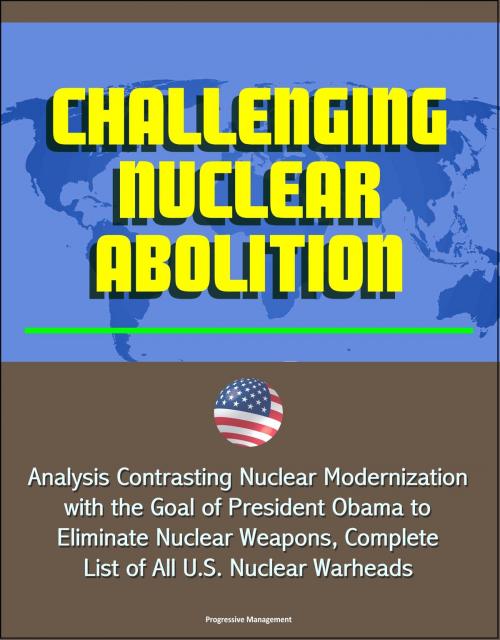Challenging Nuclear Abolition: Analysis Contrasting Nuclear Modernization with the Goal of President Obama to Eliminate Nuclear Weapons, Complete List of All U.S. Nuclear Warheads
Nonfiction, History, Military, Nuclear Warfare| Author: | Progressive Management | ISBN: | 9781310572937 |
| Publisher: | Progressive Management | Publication: | February 24, 2015 |
| Imprint: | Smashwords Edition | Language: | English |
| Author: | Progressive Management |
| ISBN: | 9781310572937 |
| Publisher: | Progressive Management |
| Publication: | February 24, 2015 |
| Imprint: | Smashwords Edition |
| Language: | English |
Nuclear weapons policy has recently gained national exposure by the fact that the president declared a desire to reduce the number of nuclear weapons with a final goal of eliminating them all together. The other factor that gave yeast to the issue was the pronouncement by former secretaries of state Henry Kissinger and George Shultz; former secretary of defense William Perry; former senator Sam Nunn; and other luminaries that the nation should support elimination of nuclear weapon all together. Dr. Lowther breaks down the elements of the debate between "abolitionists" on the one hand, and the "modernizers" on the other, who have opposing views of the utility of nuclear weapons. What makes the issue complex is that there is clearly a value to nuclear weapons, and total elimination tends to be a far off, if attractive goal. In the meantime the nation has to decide how to deal with our reality which not only has national and international deterrent implications, but is also a matter of science. In the interim the nation must modernize its weapons because they are getting old. We must also update our delivery systems and even decide whether we need three systems: airplanes, missiles and submarines. Finally, we need to refresh our aging scientist and engineering base. We cannot easily replace those who put together our current arsenal.
A generation after the fall of the Berlin Wall and the collapse of the Soviet Union, the United States stands at a crossroad. One path leads to a reinvigoration of the nuclear enterprise, while the other promises an end to nuclear weapons. Those that advocate the recapitalization of the nuclear enterprise fall into the "modernizer" camp. They believe that America's nuclear arsenal prevented the United States and Soviet Union from engaging in a large-scale conventional conflict during the Cold War. Deterrence was successful because the consequences of its failure were too terrible to risk. Thus, the modernizers advocate a renewed emphasis on the nuclear enterprise, design of new warheads, and the development of new delivery platforms. For modernizers, capability and credibility are inextricably linked, and both are an important element of deterrence. And, perhaps most importantly, modernizers do not believe that the end of the Cold War fundamentally changed the nature of power, persuasion, and the use of violence. Today, just as during the Cold War, nuclear weapons remain a vital element of US national security. Those advocating that the nation follow a different path are the "abolitionists." Often found in academia, Washington-based lobbying organizations, and the remnants of the peace movement, abolitionists are focused on eliminating nuclear weapons completely. They suggest that these weapons are too destructive and could fall into the hands of someone willing to use them. Thus, the United States must lead the way in their reduction and elimination. As abolitionists suggest, the world will be a safer place without them.
Nuclear weapons policy has recently gained national exposure by the fact that the president declared a desire to reduce the number of nuclear weapons with a final goal of eliminating them all together. The other factor that gave yeast to the issue was the pronouncement by former secretaries of state Henry Kissinger and George Shultz; former secretary of defense William Perry; former senator Sam Nunn; and other luminaries that the nation should support elimination of nuclear weapon all together. Dr. Lowther breaks down the elements of the debate between "abolitionists" on the one hand, and the "modernizers" on the other, who have opposing views of the utility of nuclear weapons. What makes the issue complex is that there is clearly a value to nuclear weapons, and total elimination tends to be a far off, if attractive goal. In the meantime the nation has to decide how to deal with our reality which not only has national and international deterrent implications, but is also a matter of science. In the interim the nation must modernize its weapons because they are getting old. We must also update our delivery systems and even decide whether we need three systems: airplanes, missiles and submarines. Finally, we need to refresh our aging scientist and engineering base. We cannot easily replace those who put together our current arsenal.
A generation after the fall of the Berlin Wall and the collapse of the Soviet Union, the United States stands at a crossroad. One path leads to a reinvigoration of the nuclear enterprise, while the other promises an end to nuclear weapons. Those that advocate the recapitalization of the nuclear enterprise fall into the "modernizer" camp. They believe that America's nuclear arsenal prevented the United States and Soviet Union from engaging in a large-scale conventional conflict during the Cold War. Deterrence was successful because the consequences of its failure were too terrible to risk. Thus, the modernizers advocate a renewed emphasis on the nuclear enterprise, design of new warheads, and the development of new delivery platforms. For modernizers, capability and credibility are inextricably linked, and both are an important element of deterrence. And, perhaps most importantly, modernizers do not believe that the end of the Cold War fundamentally changed the nature of power, persuasion, and the use of violence. Today, just as during the Cold War, nuclear weapons remain a vital element of US national security. Those advocating that the nation follow a different path are the "abolitionists." Often found in academia, Washington-based lobbying organizations, and the remnants of the peace movement, abolitionists are focused on eliminating nuclear weapons completely. They suggest that these weapons are too destructive and could fall into the hands of someone willing to use them. Thus, the United States must lead the way in their reduction and elimination. As abolitionists suggest, the world will be a safer place without them.















